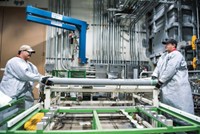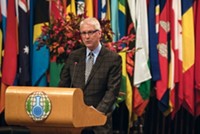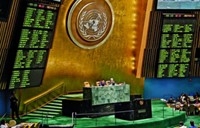Advertisement
Grab your lab coat. Let's get started
Welcome!
Welcome!
Create an account below to get 6 C&EN articles per month, receive newsletters and more - all free.
It seems this is your first time logging in online. Please enter the following information to continue.
As an ACS member you automatically get access to this site. All we need is few more details to create your reading experience.
Not you? Sign in with a different account.
Not you? Sign in with a different account.
ERROR 1
ERROR 1
ERROR 2
ERROR 2
ERROR 2
ERROR 2
ERROR 2
Password and Confirm password must match.
If you have an ACS member number, please enter it here so we can link this account to your membership. (optional)
ERROR 2
ACS values your privacy. By submitting your information, you are gaining access to C&EN and subscribing to our weekly newsletter. We use the information you provide to make your reading experience better, and we will never sell your data to third party members.
Chemical Weapons
Countries convene to update chemical weapons prohibitions
Top issues include clarifying use of riot-control agents, monitoring science and technology advances
by Jyllian Kemsley
November 16, 2018
| A version of this story appeared in
Volume 96, Issue 46
Chemical weapons attacks over the past few years—against civilians and combatants in Iraq and Syria and in assassinations in Malaysia and the U.K.—have increased attention on the use of chemicals in conflicts. They’ve also brought new urgency to international Chemical Weapons Convention meetings that start on Nov. 19 in the Netherlands.
The Chemical Weapons Convention is an arms-control treaty that prohibits the development, production, stockpiling, and use of chemical weapons. It went into force in 1997 and is overseen by the Organisation for the Prohibition of Chemical Weapons (OPCW). Much of OPCW’s work during its first two decades has focused on the destruction of chemical weapons stockpiles.
Now, OPCW must decide “how best to evolve to prevent the reemergence of chemical weapons in a period of rapid scientific change and unstable international security,” say Michael Crowley, Lijun Shang, and Malcolm Dando of the University of Bradford (Science 2018, DOI: 10.1126/science.aav5129).
Among the key issues facing OPCW going forward are the development and use of riot-control agents, such as tear gas, and delivery systems for such agents, Crowley, Shang, and Dando say. Misuse of riot-control agents in facilities where individuals cannot disperse—such as in hospitals, prisons, and homes—can cause serious injury or death. The nature of law-enforcement activities allowed under the treaty must be clarified, Crowley and colleagues say. They also advocate for strengthening OPCW’s Technical Secretariat to better monitor science and technology advances and forecast how those advances might affect chemical weapons development and use.





Join the conversation
Contact the reporter
Submit a Letter to the Editor for publication
Engage with us on Twitter